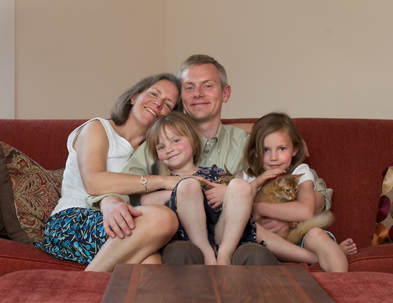 Ruth, Bridges, and daughters
Ruth, Bridges, and daughters
Ruth, Bridges, and family
Why did you choose to live at NNF?
We had been living in suburban Boston with small children and we felt isolated and had little sense of community. Although we wanted to move to a more rural area so we had easier access to the outdoors, we had always been reluctant to move away from the suburbs, fearing even greater isolation. So when we heard about NNF it sounded ideal. It offered a real neighborhood (without the constant cars, leaf blowers, and construction that we had endured) in a small town in rural New Hampshire that had a vibrant outdoors and arts scene.
What do you value about living at NNF?
What we value has changed somewhat as our kids have gotten older. When they were younger, it was the freedom that they could have within the neighborhood due to the pedestrian aspect and the ease of access to playmates. As they have gotten older, that freedom has expanded to include the town of Peterborough, and while they have also developed lives and friendships beyond the neighborhood, they value it as their home base and have strong relationships here. For us, we value the ease of socializing, whether at our weekly common meal, neighborhood events, or just stopping to chat with a neighbor who is sitting on their front porch. We have also benefitted greatly from community farming and animal rearing. We have done things we never would have done on our own (including raising chickens, sheep, pigs, and cows, making apple cider and maple syrup, and building a hoop house).
What should others considering cohousing be aware of?
That while this may be an idealistic way to live, idealists are not necessarily the best fit for cohousing. We have found that the people who are happiest here tend to be flexible and able to let go of their own personal preconceptions for the overall benefit of the neighborhood.
What are common misconceptions about cohousing?
One is that you have no privacy if you live here. That’s just not true. Every household really sets their own boundaries with respect to the neighborhood. Another is that we all hang out together all the time. That’s not true either. Most people have interesting, full lives outside of the neighborhood. The neighborhood is really just a better version of the best suburban neighborhood.
Why did you choose to live at NNF?
We had been living in suburban Boston with small children and we felt isolated and had little sense of community. Although we wanted to move to a more rural area so we had easier access to the outdoors, we had always been reluctant to move away from the suburbs, fearing even greater isolation. So when we heard about NNF it sounded ideal. It offered a real neighborhood (without the constant cars, leaf blowers, and construction that we had endured) in a small town in rural New Hampshire that had a vibrant outdoors and arts scene.
What do you value about living at NNF?
What we value has changed somewhat as our kids have gotten older. When they were younger, it was the freedom that they could have within the neighborhood due to the pedestrian aspect and the ease of access to playmates. As they have gotten older, that freedom has expanded to include the town of Peterborough, and while they have also developed lives and friendships beyond the neighborhood, they value it as their home base and have strong relationships here. For us, we value the ease of socializing, whether at our weekly common meal, neighborhood events, or just stopping to chat with a neighbor who is sitting on their front porch. We have also benefitted greatly from community farming and animal rearing. We have done things we never would have done on our own (including raising chickens, sheep, pigs, and cows, making apple cider and maple syrup, and building a hoop house).
What should others considering cohousing be aware of?
That while this may be an idealistic way to live, idealists are not necessarily the best fit for cohousing. We have found that the people who are happiest here tend to be flexible and able to let go of their own personal preconceptions for the overall benefit of the neighborhood.
What are common misconceptions about cohousing?
One is that you have no privacy if you live here. That’s just not true. Every household really sets their own boundaries with respect to the neighborhood. Another is that we all hang out together all the time. That’s not true either. Most people have interesting, full lives outside of the neighborhood. The neighborhood is really just a better version of the best suburban neighborhood.